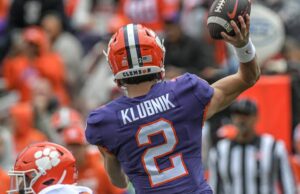
Breaking News: Clemson Tigers’ Quarterback Cade Klubnik Commits to Alabama Football with $56 Million NIL Deal — What’s Next for Clemson?
In a stunning turn of events, Clemson Tigers’ star quarterback Cade Klubnik has announced his decision to transfer to the Alabama Crimson Tide, lured by a record-breaking $56 million Name, Image, and Likeness (NIL) deal. The move has sent shockwaves through the college football world, raising significant questions about the future of Clemson’s program and the shifting dynamics of NIL-driven recruitment in collegiate sports.
A Historic Transfer Deal
Klubnik, a former five-star recruit and one of the most highly regarded quarterbacks in the nation, has been a cornerstone of the Clemson Tigers’ offense since taking over as the starting quarterback. His leadership and playmaking ability made him a key figure in Clemson’s efforts to regain dominance in the ACC and national title contention.
However, Alabama’s enticing NIL offer has proved too tempting to resist. The $56 million package, reportedly spread across multiple years and sponsored by major corporations with ties to the Alabama athletic program, sets a new benchmark for NIL deals in college sports. This unprecedented offer highlights the rapidly evolving landscape of collegiate athletics, where NIL opportunities now play a central role in recruitment and retention.
Alabama head coach Nick Saban, known for his ability to attract top-tier talent, welcomed Klubnik with high praise:
“Cade is an exceptional talent and an outstanding leader on and off the field. We’re excited to see what he can achieve as part of the Alabama football family.”
The Fallout for Clemson
The departure of Cade Klubnik leaves Clemson in a precarious position. Head coach Dabo Swinney and his staff must now navigate the fallout from losing their starting quarterback and the ripple effects it will have on the program’s trajectory.

Immediate Roster Concerns
Clemson’s quarterback depth chart takes a significant hit with Klubnik’s exit. The team must now rely on backups, including rising sophomore Christopher Vizzina and freshman commit Walker White, to fill the void. While both players have shown potential, neither possesses the immediate experience or star power that Klubnik brought to the table.
Swinney, known for his focus on developing talent within the program, will face pressure to accelerate the growth of his young quarterbacks or explore options in the transfer portal. The latter option may be challenging, as the best available quarterbacks are likely to be courted by other powerhouse programs with stronger NIL incentives.
Recruiting Implications
The loss of Klubnik could also impact Clemson’s ability to attract top-tier recruits. Quarterbacks, wide receivers, and other skill-position players often base their decisions on the presence of a proven signal-caller. Klubnik’s departure may cause potential recruits to reconsider their commitments or explore other programs with more stable offensive outlooks.
Additionally, this high-profile transfer underscores the increasing importance of NIL opportunities in recruiting battles. Clemson, historically reliant on a culture-driven approach, may need to adapt its strategy to remain competitive in the NIL era.
Dabo Swinney’s Next Move
For head coach Dabo Swinney, this moment represents a critical juncture in his tenure at Clemson. Known for his traditionalist views and resistance to rapid change, Swinney has faced criticism in recent years for his reluctance to embrace the full potential of NIL deals. Klubnik’s transfer could serve as a wake-up call for the Tigers’ program to modernize its approach.
Addressing NIL Strategy
To remain competitive in the NIL-driven landscape, Clemson may need to enhance its infrastructure for securing lucrative deals for players. This includes building partnerships with local and national businesses, creating a dedicated NIL department, and educating athletes on leveraging their personal brands.
Exploring the Transfer Portal
Swinney has traditionally avoided heavy reliance on the transfer portal, preferring to develop homegrown talent. However, the urgency of replacing Klubnik may force a shift in philosophy. The Tigers could pursue experienced quarterbacks currently in the portal, aiming to find a proven leader who can step in and compete immediately.
Rebuilding Team Morale
Losing a player of Klubnik’s caliber can demoralize a team, especially when the move is perceived as a financial decision rather than a football-driven one. Swinney will need to rally his players, emphasizing the strength of Clemson’s culture and the opportunities that remain for success in the coming season.
The Broader NIL Landscape
Klubnik’s $56 million deal has reignited debates about the impact of NIL on college football. Supporters argue that players should capitalize on their market value, while critics worry that such deals create an uneven playing field and prioritize financial incentives over team loyalty.
Concerns About Competitive Balance
Programs with larger NIL war chests, like Alabama, are increasingly able to outbid smaller programs for top talent. This raises questions about whether college football is becoming a pay-to-play system, eroding the traditional values of competition and parity.
Calls for Regulation
The NCAA and other governing bodies face growing pressure to establish clearer guidelines for NIL deals. Without regulation, concerns about fairness, transparency, and long-term sustainability will continue to mount.

What’s Next for Clemson Football?
While the loss of Cade Klubnik is a significant setback, Clemson has the infrastructure, talent, and leadership to recover. Here’s a look at the potential path forward:
Developing Young Talent: Christopher Vizzina and Walker White will have an opportunity to step up and prove themselves. Swinney’s track record of developing quarterbacks, including Deshaun Watson and Trevor Lawrence, provides hope for a bright future.
Adapting to NIL Realities: Clemson must embrace the NIL era and position itself as a competitive destination for top talent. This includes building stronger relationships with sponsors and emphasizing the long-term benefits of joining the Tigers.
Strengthening Recruiting: The program will need to reassure recruits that Clemson remains a top-tier destination, capable of competing for championships despite recent challenges.
- Targeting the Transfer Portal: Strategic use of the portal could help address immediate roster gaps, ensuring the Tigers remain competitive in the ACC and nationally.
Final Thoughts
Cade Klubnik’s decision to join Alabama represents a turning point not only for Clemson but for college football as a whole. It highlights the growing influence of NIL in shaping player decisions and underscores the need for programs to adapt to an ever-changing landscape.
For Clemson, this moment is an opportunity to reassess and innovate. While the loss of a star quarterback is a blow, the Tigers have overcome adversity before. With Dabo Swinney at the helm, Clemson has the tools and determination to navigate this challenge and emerge stronger.
As the college football world watches closely, one thing is certain: the ripple effects of this historic transfer will be felt for years to come.
Leave a Reply